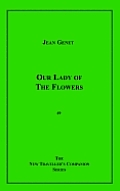Genet, Jean. Our Lady of the Flowers. Trans. B. Frechtman. Paris: Morihien Press, 1949.
 This is a novel so entrenched in the idea of the novel-writing act as a form of self-delusion and vital fantasy that it's impossible either to know what exactly happened and didn't happen in the world of the book and also to say anything engaging about it this soon after-the-fact. I'll try, though.
This is a novel so entrenched in the idea of the novel-writing act as a form of self-delusion and vital fantasy that it's impossible either to know what exactly happened and didn't happen in the world of the book and also to say anything engaging about it this soon after-the-fact. I'll try, though.Quickly: Jean Genet wrote this while in prison for theft. His narrator is a man in prison (guess his name) who bides the time until his trial by making up a story about Divine, a femmey alter ego who picks up tricks here and there, and falls in love with the hairy and smelly and tres butch pimp, Darling—pimp being the old-skool term for gigolo. Also, there's a thief/murderer nicknamed Our Lady of the Flowers. So you have a love triangle of sorts in place (Darling and Our Lady turn out to be father and son, respectively), with the third figure being both left out of things (in the form of Divine) and yet both the creator and thus benefactor of it all (in the form of Jean).
The language is almost oppressively gorgeous and intense. That's a false adverb. Doggedly? Exhaustedly? Here's my favorite passage:
Standing and from afar, my body passes through thine and thine, from afar, through mine. We are creating the world. Everything changes...and knowing it!The superior translation of the novel, by the same dude but like done twenty years later or something, ends that passage with "come", which is probably better.
Loving each other like, before separating, two fighting young boxers who tear each other's shirt, and, when they are nude, stupefied at being so beautiful, think they see themselves in a mirror, stand there open-mouthed a second, shake (the rage at being caught in a trap) their tangled hair, smile at each other (a damp smile) and grip each other like two wrestlers in Greco-Roman wrestling, interlock their muscles in the perfect connections offered by the muscles of the other, and drop to the mat while their hot sperm spurting high up maps out on the sky a milky way* where other constellations which I know how to read are inscribed: the constellations of the Sailor, the Boxer, the Cyclist, the Fiddler, the Spahi, the Dagger. Thus, a new map of Heaven is outlined on the wall of the garret where Divine, after each masturbation, shoots her spunk (63).
At any rate, a very good paper on this novel points to the above as an instance of gay fiction performing simultanesouly an ethnography of its characters and also a catalogue of those characters' desires. Which might just be fancy academic speak for "gay men are who they want but don't always want who they are."
===
* This is the second best description of the Milky Way I've read of late. The best was in one of the books written about below, who knows which, wherein the Milky Way is described as something erased on a blackboard.


0 Comments:
Post a Comment
<< Home